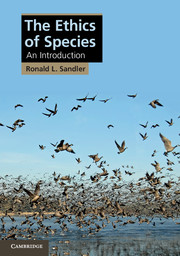Book contents
9 - Conclusion
Published online by Cambridge University Press: 05 November 2012
Summary
Species are beautiful and wonderful. They are also historical phenomena. They are instantiated at a time and place, they can change over time, and they go extinct. We can influence these events and processes, and increasingly do so as our technological capabilities expand. Therefore, an ethic of species is needed to guide choices regarding preserving, modifying, and creating them. Central to an ethic of species is an account of the value of species and the ethical significance of species boundaries. With respect to these, I have argued:
Some individual species and biodiversity in general have significant instrumental value (present and/or option value), though most individual species do not.
Some individual species and biodiversity in general have considerable preference and integral subjective final value, though most individual species do not.
Species do not have interest-based objective final value (i.e., inherent worth).
Species should not be regarded as possessing natural historical objective final value.
All individual living things, including nonsentient and artifactual ones, have inherent worth, as do some (nonspecies) collectives.
An entity’s moral status is underdetermined by its worth, since it depends as well on its capacities and relationships, as well as on features of our form of life.
A capacities-oriented approach is the most justified account of moral status, and on it biological group membership is not among the properties relevant to either inherent worth or moral status.
Species boundaries do not have objective ethical significance.
Species boundaries have subjective ethical significance.
Homo sapiens species boundaries do not have any unique or special ethical significance, with respect to either moral status or human modification.
- Type
- Chapter
- Information
- The Ethics of SpeciesAn Introduction, pp. 198 - 200Publisher: Cambridge University PressPrint publication year: 2012



